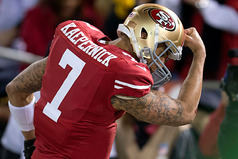 What do we mean when we say “America”? This is a more complicated question than it first appears. To answer it, of course, we need to talk about football. During the NFL preseason, most professional football players are focused on only one thing: not tearing their ACLs. But this year, Colin Kaepernick caused an uproar for choosing to sit during the national anthem. As he said in interviews, he is disheartened and incensed by racial prejudice in America, in particular with regard to police brutality. “This country stands for freedom, liberty, justice for all,” Kaepernick said, “And it’s not happening for all right now.” Unsurprisingly, there has been considerable backlash against Kaepernick for this, principally asserting that it is an act of disrespect against America and American veterans. Equally unsurprisingly, there has been backlash against the backlash and protests against the protests. For the moment, I’m not going to protest anything. I simply want to use this as an opportunity to point out a rhetorical effect at play in the conversation. What do we mean when we say “America”? In the media back-and-forth about Kaepernick, the term “America” gets used in a variety of ways. We can get at some of them by asking, “Is Colin Kaepernick protesting America?” If by “America,” we mean “American culture and leadership as it currently is,” then yes, Kaepernick is protesting that. Kaepernick believes there is something deeply flawed with the American legal system, notably its leniency toward police officers who unjustly kill black people in the line of duty. If by “America,” however, we mean “core and defining American values,” then no, Kaepernick is not protesting that. Remember, he said, ‘This country stands for freedom, liberty, justice for all. And it’s not happening for all right now.” This is a failure of Americans in positions of leadership to live up to the standard of American values. The problem with America is it’s not being America, and Kaepernick will stand for the anthem as soon as America becomes more like America.
Some have objected that Kaepernick by refusing to stand for the anthem is disrespecting what many veterans worked, fought, and died for. But is he? If we say that U.S. troops fought for America, what do we mean by “America”? Do we mean “American culture and leadership as it currently is” or do we mean “core and defining American values”? When soldiers swear to defend “the Constitution and laws of the United States against all enemies, foreign and domestic,” are they swearing to defend racist policing? Is the “America” that our veterans fight for the America that Kaepernick is protesting, or the standard he is using to critique it? Kaepernick has an answer. When asked about the military in the same interview, he said, “I have great respect for men and women that have fought for this country,” and continued, “They fight for freedom. They fight for the people, they fight for liberty and justice for everyone. And that’s not happening. People are dying in vain because this country isn’t holding their end of the bargain up.” There’s an ambiguity here—do our troops fight for the country that is withholding justice from its people, or the people who are being stiffed by their country? Which is “America”? Here’s the ambiguity: Kaepernick is respecting America by disrespecting America. James Baldwin captured this ambiguity when he said, “I love America more than any other country in the world and, exactly for this reason, I insist on the right to criticize her perpetually.” The question that remains is, are Kaepernick’s patriotic critics respecting or disrespecting America by insisting that the America he is protesting is the America worth fighting for?
0 Comments
Leave a Reply. |
Archives
September 2020
Categories
All
|
 RSS Feed
RSS Feed